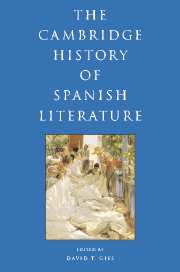Book contents
- Frontmatter
- I INTRODUCTION
- II HISTORY AND CANONICITY
- III THE MEDIEVAL PERIOD
- IV EARLY MODERN SPAIN: RENAISSANCE AND BAROQUE
- V THE ENLIGHTENMENT AND NEOCLASSICISM
- VI THE FORGING OF A NATION: THE NINETEENTH CENTURY
- VII THE MODERN, MODERNISMO, AND THE TURN OF THE CENTURY
- VIII TWENTIETH-CENTURY SPAIN AND THE CIVIL WAR
- IX IN AND OUT OF FRANCO SPAIN
- 46 The literature of Franco Spain, 1939–1975
- 47 Twentieth-century literature in exile
- 48 Prose in Franco Spain
- 49 Poetry in Franco Spain
- 50 Theatre in Franco Spain
- 51 Film and censorship under Franco, 1937–1975
- X POST-FRANCO SPANISH LITERATURE AND FILM
- Bibliography
- Index
- References
50 - Theatre in Franco Spain
from IX - IN AND OUT OF FRANCO SPAIN
Published online by Cambridge University Press: 28 March 2008
- Frontmatter
- I INTRODUCTION
- II HISTORY AND CANONICITY
- III THE MEDIEVAL PERIOD
- IV EARLY MODERN SPAIN: RENAISSANCE AND BAROQUE
- V THE ENLIGHTENMENT AND NEOCLASSICISM
- VI THE FORGING OF A NATION: THE NINETEENTH CENTURY
- VII THE MODERN, MODERNISMO, AND THE TURN OF THE CENTURY
- VIII TWENTIETH-CENTURY SPAIN AND THE CIVIL WAR
- IX IN AND OUT OF FRANCO SPAIN
- 46 The literature of Franco Spain, 1939–1975
- 47 Twentieth-century literature in exile
- 48 Prose in Franco Spain
- 49 Poetry in Franco Spain
- 50 Theatre in Franco Spain
- 51 Film and censorship under Franco, 1937–1975
- X POST-FRANCO SPANISH LITERATURE AND FILM
- Bibliography
- Index
- References
Summary
The Spanish stage of the early post-Civil-War period reflected the ideological split that continued after Franco’s victory in 1939. When Antonio Buero Vallejo (1916–2000), a former political prisoner who fought on the losing side in the Civil War, had his tragedy, Historia de una escalera (“Story of a Stairway”) premièred in 1949, Spain found a new voice and a new vehicle for revealing a reality absent from a stage dominated by rightist plays glorifying National Catholicism and the imperial dream, on the one hand, and by light comedies, on the other. While the first plays represented an “official” or Francoist culture and the second, a culture of “evasion,” Buero’s play represented a dissident culture that brought to the stage the harsh reality of the early postwar period.
The “official” theatre – heroic pieces by playwrights such as José María Pemán (1897–1981) and Juan Ignacio Luca de Tena (1897–1975) – reflected the Franco régime’s vision of itself as heir to what it considered Spain’s past glories and national virtues as they idealized a dubious past while ignoring real problems of their own present. While such plays, of little lasting value, continued the Spanish Romantic tradition, the serious comedies of Miguel Mihura (1905–1977), Edgar Neville (1899–1967), José López Rubio (1903–1996), and Víctor Ruiz Iriarte (1912–1982) participated in international currents of their time. Mihura’s Tres sombreros de copa (“Three Top Hats,” 1952) has been recognized as a precursor of the Theatre of the Absurd. López Rubio’s and Ruiz Iriarte’s plays are also characterized by experimentation with the absurd as well as by metatheatre (theatre about theatre) and various forms of theatricalist staging.
- Type
- Chapter
- Information
- The Cambridge History of Spanish Literature , pp. 659 - 676Publisher: Cambridge University PressPrint publication year: 2005



